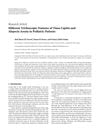 January 2024 in “Cosmetics”
January 2024 in “Cosmetics” HAIR & SCALP COMPLEX may help treat hair loss by stimulating hair growth and restarting the hair cycle.
 March 2024 in “Healthcare”
March 2024 in “Healthcare” Stem cell treatment improved life quality and sexual function in women with hair loss.
 January 2025 in “Cosmetics”
January 2025 in “Cosmetics” Astragalus sinicus extracts may help promote hair growth and treat hair loss.
 5 citations,
March 2017 in “Laser Physics Letters”
5 citations,
March 2017 in “Laser Physics Letters” Different scalp imaging methods are important for studying hair and scalp health and require more volunteers for better evaluation.
 August 2016 in “Journal of Investigative Dermatology”
August 2016 in “Journal of Investigative Dermatology” DHT reduces a cell's ability to promote hair growth, while 3D culture without DHT improves it.
 27 citations,
April 2018 in “Journal of autoimmunity”
27 citations,
April 2018 in “Journal of autoimmunity” iNKT cells can help prevent and treat alopecia areata by promoting hair regrowth.
 October 2024 in “Annals of Allergy Asthma & Immunology”
October 2024 in “Annals of Allergy Asthma & Immunology” Anaphylaxis from cow's milk allergy can cause temporary hair loss in children.
November 2022 in “Journal of Cosmetic Dermatology” The combined therapy significantly increased hair density and was safe for treating hair loss.
 September 2023 in “Cureus”
September 2023 in “Cureus” Early recognition and treatment of atypical alopecia areata in infants are crucial.
 January 2023 in “International journal of clinical medicine”
January 2023 in “International journal of clinical medicine” Women with PCOS and hair loss have lower levels of the protein gelsolin in their blood.
 32 citations,
January 2014 in “Dermatology Research and Practice”
32 citations,
January 2014 in “Dermatology Research and Practice” Trichoscopy can effectively tell apart tinea capitis and alopecia areata in children by looking for specific hair shapes.
 6 citations,
June 2011 in “British Journal of Dermatology”
6 citations,
June 2011 in “British Journal of Dermatology” People with alopecia areata have higher levels of RBP4 protein and antibodies against it.
1 citations,
May 2022 in “International Journal of Cosmetic Science” Edelweiss extract can increase hair density and promote hair growth.
 November 2023 in “Journal of Cosmetic Dermatology”
November 2023 in “Journal of Cosmetic Dermatology” People with non-scarring hair loss often have lower vitamin D levels than those without hair loss.
 October 2023 in “Applied materials today”
October 2023 in “Applied materials today” New treatment for hair loss using special microneedles shows promise in reducing inflammation and promoting hair growth.
 September 2023 in “Clinical, Cosmetic and Investigational Dermatology”
September 2023 in “Clinical, Cosmetic and Investigational Dermatology” Higher SHBG levels are linked to less severe hair loss in women, but vitamin D levels don't seem to affect hair loss.
 January 2020 in “Journal of Cosmetics, Dermatological Sciences and Applications”
January 2020 in “Journal of Cosmetics, Dermatological Sciences and Applications” DEEPLY ROOTED® supplement seems to effectively improve hair growth and quality in women with no side effects.
 788 citations,
February 2007 in “Nature”
788 citations,
February 2007 in “Nature” The document concludes that skin stem cells are important for hair growth and wound healing, and could be used in regenerative medicine.
42 citations,
April 2021 in “JCI insight” Blocking JAK3 signaling can reverse hair loss from alopecia areata.
 41 citations,
January 2020 in “BioMed Research International”
41 citations,
January 2020 in “BioMed Research International” Micrografts improve hair density and thickness without side effects.
 38 citations,
February 2012 in “Supportive Care in Cancer”
38 citations,
February 2012 in “Supportive Care in Cancer” Skin problems like acne, dry skin, and nail and hair changes are common in patients taking EGFR inhibitors.
 2 citations,
January 2023 in “Dermatology Practical & Conceptual”
2 citations,
January 2023 in “Dermatology Practical & Conceptual” AB+ blood group is more common in alopecia areata patients.
 2 citations,
December 2022 in “PNAS nexus”
2 citations,
December 2022 in “PNAS nexus” SCD-153 shows promise as an effective topical treatment for alopecia areata.
1 citations,
February 2023 in “Plants” BB4CMU rice bran oil may help treat hair loss and gray hair.
 October 2024 in “Frontiers in Nutrition”
October 2024 in “Frontiers in Nutrition” Vitamin D deficiency is common in people with certain types of hair loss, like alopecia areata and female pattern hair loss.
 October 2023 in “Biomaterials”
October 2023 in “Biomaterials” Nanotechnology could improve hair regrowth but faces challenges like complexity and safety concerns.
 April 2018 in “Journal of Investigative Dermatology”
April 2018 in “Journal of Investigative Dermatology” Hair pattern in androgenetic alopecia overlaps with scalp and bone demarcations, with distinct gene profiles affecting susceptibility.
 38 citations,
June 2015 in “Expert Opinion on Therapeutic Targets”
38 citations,
June 2015 in “Expert Opinion on Therapeutic Targets” Blocking the prolactin receptor might help treat various diseases, but more research is needed.
 9 citations,
February 2022 in “Nature communications”
9 citations,
February 2022 in “Nature communications” Rare changes in the KRT82 gene are linked to a higher risk of Alopecia Areata.
 2 citations,
July 2022 in “Dermatology practical & conceptual”
2 citations,
July 2022 in “Dermatology practical & conceptual” Iron deficiency anemia may contribute to hair loss in women with Telogen effluvium.


























